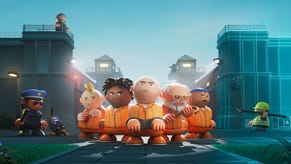Ken Levine's next won't be a linear narrative
"Narrative doesn't lend itself to systems."
Ken Levine is an old dog trying to learn new tricks. The BioShock creator took to open-micing his new philosophies in a GDC panel attended by Eurogamer, the way a comedian will test new material at a club on an off night.

Levine said he's spent 19 years working on linear narratives, but he's a bit sick of sticking to this path. The legendary designer kicked off his talk by discussing the negatives to a linear narrative.
For starters, these sorts of games - like BioShock Infinite - are expensive, Levine lamented. Furthermore, he noted that these types of stories don't "fully embrace the unique power of games," nor are they "player driven."
"Narrative doesn't lend itself to systems," he added, before noting that narratively-driven games also tend to have poor replay value.
"I'm proud of what we did with linear narrative," Levine said. "But I've personally been doing it for over 19 years."
"The problem with narrative is that you sort of have to keep getting bigger and bigger and bigger. That gets time consuming. That gets expensive. And you're devoting years and years of your life to this one sort of big moment," he added. "You ship the game, and it comes out, and people play the game and it's 12 hours long and people have a great experience and you see cosplayers and fans for years like that, but you don't have that constant engagement with the audience."
"Linear narrative puts a boundary between the developer and the audience. Because once you have a 'would you kindly' or something like that in your story, you can't say 'hey, player, open alpha!' Because once that's revealed - once those key story bits are revealed - that's really your secret sauce. So we had to have a lot of secrecy. We had to have a lot of closed doors. And we got very good at keeping secrets, but I don't think we ever really enjoyed the process of keeping secrets. It got very stressful and I don't think it was great for building relationships with the audience."
Going forward, Levine wants to change this and create a "narrative-driven experience" where the "narrative elements are non-linear and interact with each other" and "all narrative elements trigger off player action."
While Levine wants his next project to be narratively open-ended, he doesn't want this to get too convoluted. "You're going to have to balance these things off one another, but they're all going to be transparent to you," he explained. "We're going to have to have a limited number of them so you can track them all and it doesn't become a giant spreadsheet that overwhelms you."
One example Levine gave was deciding which of two NPCs to date. One might have a personality the player likes more, while the other has more practical gameplay bonuses.
While we're sure there will be differences, Levine's upcoming project sounded an awful lot like the sort of thing BioWare and Bethesda have been doing for ages. Still, this sort of player-driven, choice-focused non-linear experience will be uncharted territory for Levine, so it'll be interesting to see how he implements this new design going forward in whatever it is he's brewing up.









